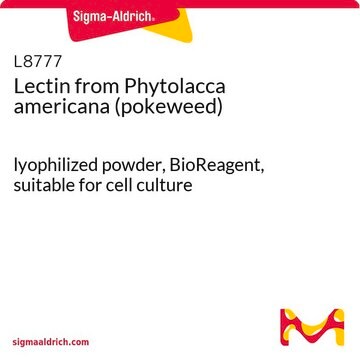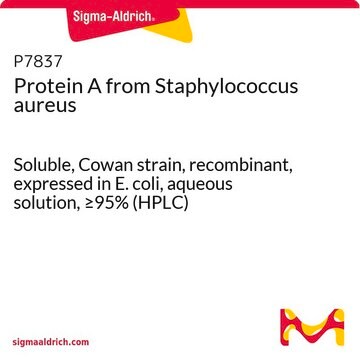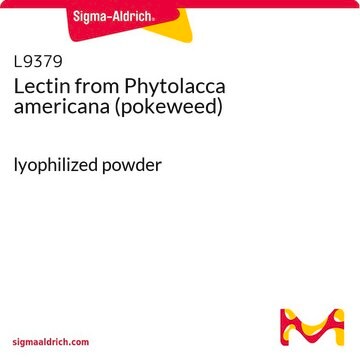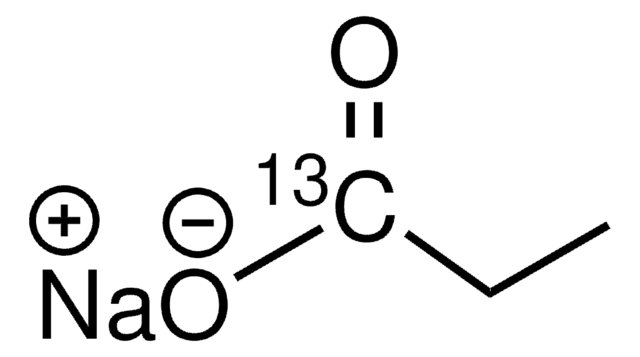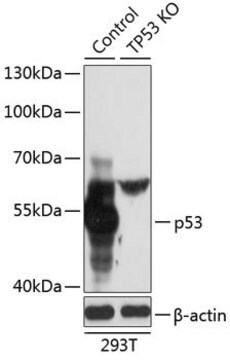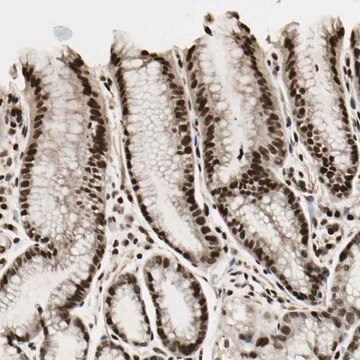추천 제품
형태
suspension (Homogeneous)
Quality Level
제조업체/상표
Calbiochem®
저장 조건
do not freeze
불순물
≤2500 cells/mL Viable cells
색상
milky
용량
≥2.0 mg(human IgG/100 mg cells)
배송 상태
ambient
저장 온도
2-8°C
일반 설명
PANSORBIN Cells are heat-killed, formalin-fixed Staphylococcus aureus cells that have a coat of protein A and have been pickled by the method of Kessler. Useful for mitogenic stimulation of B lyphocytes and for immunoprecipitation.
Heat-killed, formalin-fixed Staphylococcus aureus cells (Cowan I strain) that bear a high cell-surface density of protein A and have been pickled by the method of Kessler. Useful as a solid-phase IgG-binding reagent due to the high affinity interaction of protein A with the Fc domain of IgG. PANSORBIN cells work best when the antibody is human (IgG1, IgG2, IgG4), rabbit IgG (all isotypes), or mouse (IgG2a, IgG2b, IgG3). Most common applications include immunoprecipitation and mitogenic stimulation of B lymphocytes.
경고
Toxicity: Standard Handling (A)
물리적 형태
Supplied as a 10% suspension of Staphylococcus aureus cells in PBS, 0.1% NaN₃, pH 7.2.
기타 정보
Kierszenbaum, F., et al. 1991. Immunology74, 317.
Meikle, P.J., et al. 1991. J. Biol. Chem.266, 22569.
Ezaki, O., et al. 1989. Biochem. Biophys. Res. Commun. 159, 1368.
Murakami, H., et al. 1988. Biochem. J.256, 917.
Kessler, S.W. 1975. J. Immunol. 115, 1617.
Meikle, P.J., et al. 1991. J. Biol. Chem.266, 22569.
Ezaki, O., et al. 1989. Biochem. Biophys. Res. Commun. 159, 1368.
Murakami, H., et al. 1988. Biochem. J.256, 917.
Kessler, S.W. 1975. J. Immunol. 115, 1617.
법적 정보
CALBIOCHEM is a registered trademark of Merck KGaA, Darmstadt, Germany
PANSORBIN is a registered trademark of Merck KGaA, Darmstadt, Germany
신호어
Warning
유해 및 위험 성명서
예방조치 성명서
Hazard Classifications
Acute Tox. 4 Oral
Storage Class Code
12 - Non Combustible Liquids
WGK
WGK 3
Flash Point (°F)
Not applicable
Flash Point (°C)
Not applicable
시험 성적서(COA)
제품의 로트/배치 번호를 입력하여 시험 성적서(COA)을 검색하십시오. 로트 및 배치 번호는 제품 라벨에 있는 ‘로트’ 또는 ‘배치’라는 용어 뒤에서 찾을 수 있습니다.
J R Faust et al.
Proceedings of the National Academy of Sciences of the United States of America, 79(17), 5205-5209 (1982-09-01)
UT-1 cells are a clone of Chinese hamster ovary cells that were selected to grow in the presence of compactin, a competitive inhibitor of 3-hydroxy-3-methylglutaryl-coenzyme A reductase [mevalonate: NADP+ oxidoreductase (CoA-acylating), EC 1.1.1.34]. These cells have 100- to 1,000-fold more
Derek Walsh et al.
Genes & development, 20(4), 461-472 (2006-02-17)
Recruitment of the 40S ribosome to the 5' end of a eukaryotic mRNA requires assembly of translation initiation factors eIF4E, the cap-binding protein, together with eIF4A and eIF4G into a complex termed eIF4F. While the translational repressor 4E-BP1 regulates binding
Yu-Jun Wang et al.
Nature communications, 14(1), 7903-7903 (2023-12-01)
Ample evidence has suggested the stress etiology of depression, but the underlying mechanism is not fully understood yet. Here, we report that chronic social defeat stress (CSDS) attenuates the excitatory output of the claustrum (CLA) to the prelimbic cortex (PL)
T A Bunch et al.
Nucleic acids research, 17(23), 9761-9782 (1989-12-11)
Genes producing antisense RNA are becoming important tools for the selective inhibition of gene expression. Experiments in different biological systems, targeting different mRNAs have yielded diverse results with respect to the success of the technique and its mechanism of action.
Leah S Bernstein et al.
Methods in molecular biology (Clifton, N.J.), 237, 195-204 (2003-09-23)
Palmitoylation refers to the covalent attachment of a 16-carbon fatty acid to cysteine residues of proteins. This modification occurs on many intracellular signaling proteins including regulators of G protein signaling proteins (RGS). Palmitoylation mediates the interaction of proteins with membranes
자사의 과학자팀은 생명 과학, 재료 과학, 화학 합성, 크로마토그래피, 분석 및 기타 많은 영역을 포함한 모든 과학 분야에 경험이 있습니다..
고객지원팀으로 연락바랍니다.
